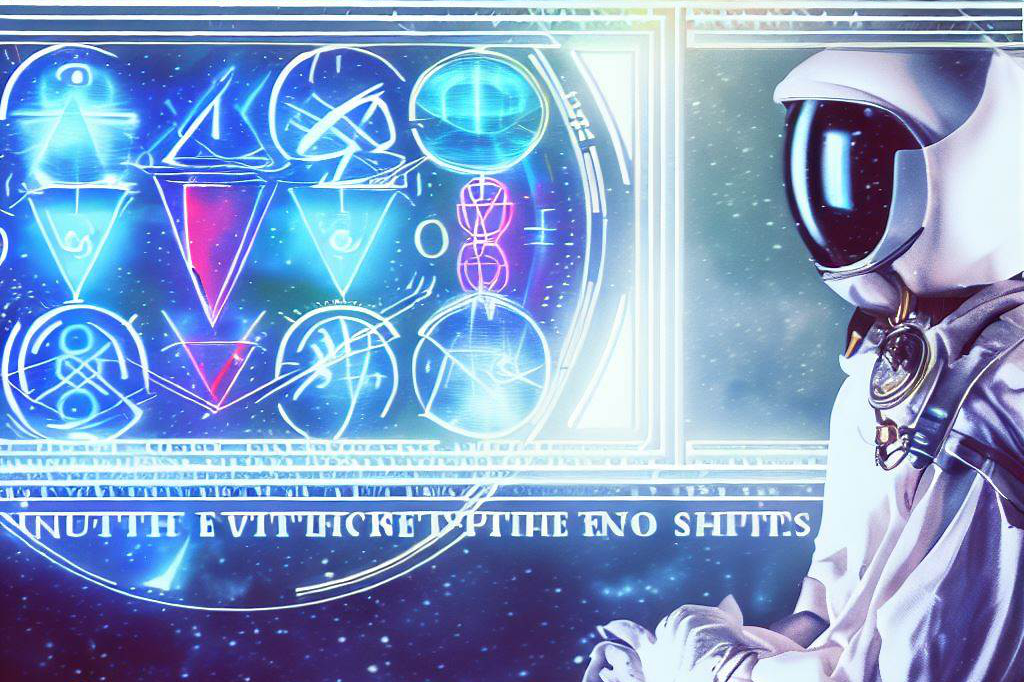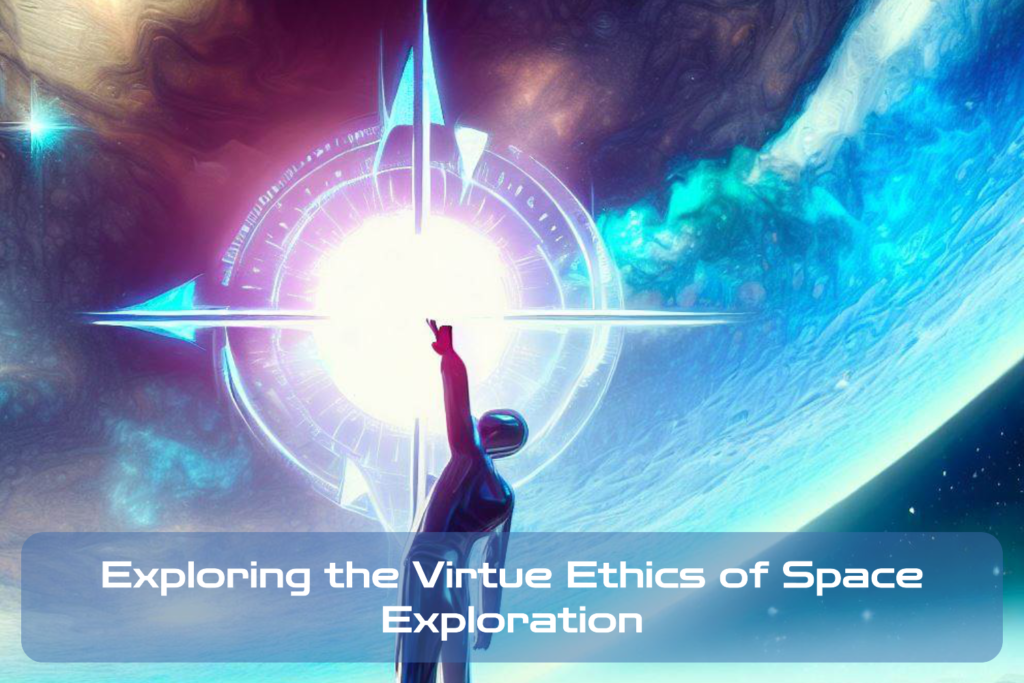Cultivating Character in the Cosmos
Exploring the Importance of Virtue Ethics and Character Development in Space Exploration
Space exploration is a fascinating topic that has captured imaginations for decades. From the first moon landing to recent expeditions to Mars, space exploration has become an important part of our quest for knowledge and understanding of the universe.
However, space exploration is not just about scientific discovery or technological advancements; it’s also about character development and cultivating virtuous behavior. The concept of virtue ethics is an ancient philosophy that emphasizes the importance of moral character over rules or consequences.
It suggests that what makes a person ethical is not simply following a set of prescribed rules, but rather living a virtuous life characterized by traits such as
- honesty,
- courage,
- justice,
- and compassion.
In the context of space exploration, this philosophy suggests that it’s not enough to simply follow protocols or directives – astronauts must also cultivate virtuous behavior to be successful.
The importance of character development in space exploration cannot be overstated. Astronauts face unique challenges that require them to possess qualities such as resilience, adaptability, and self-discipline.
They must be able to work well under pressure and make sound decisions in high-stress situations. Without these virtues, even the most technically skilled astronauts would struggle to succeed on their missions.
Thus, understanding and developing these virtues is critical for success in space exploration. Virtue ethics provides a valuable framework for understanding how character development plays a crucial role in space exploration.
Astronauts must cultivate virtues such as courage, perseverance, and curiosity if they are to succeed on their missions. While technological advancements continue to push boundaries in space exploration, we must not forget the importance of cultivating virtuous behavior among those who venture into the cosmos.
The Virtues of Space Exploration

Launching into the Unknown: Courage as a Virtue
Space exploration inherently involves stepping into the unknown. Astronauts must have the courage to leave behind their familiar lives on Earth and launch themselves into an unpredictable environment.
The courage to face physical and mental challenges, such as isolation, cramped living quarters, and possible danger is necessary for successful space missions. Courage can be cultivated through training exercises that simulate difficult situations that astronauts may face in space.
For example, NASA’s Neutral Buoyancy Laboratory (PDF) allows astronauts to practice spacewalks in a large pool simulating weightlessness. Additionally, teamwork plays a key role in developing courage as astronauts must trust their fellow crew members during missions.
Beyond Boundaries: Perseverance in the Cosmos
Perseverance is another critical virtue for successful space exploration. As we venture further into the cosmos, we encounter new obstacles that require perseverance to overcome. From equipment malfunctions to unforeseen dangers, every mission faces setbacks that demand resilience from those involved.
Perseverance can be cultivated through the repetition of tasks during training exercises and through encouragement from leaders who highlight past accomplishments despite setbacks or difficulties encountered along the way. This provides motivation to push on even when things get tough.
The Unsurpassed Drive: Curiosity Fuels Progress
Curiosity is an innate human trait that has driven exploration since time immemorial. In regards to space exploration, curiosity drives us toward discovering more about our place in the universe and developing new technologies that make it possible for us to travel further than ever before. Curiosity can be cultivated by creating a culture of inquiry within teams tasked with exploring uncharted territory in space.
Leaders can encourage curiosity by fostering an environment where ideas are freely shared, encouraging astronaut feedback on procedures or plans, and allowing room for experimentation in pursuit of discovery.
Overall, space exploration requires virtues like courage, perseverance, and curiosity to accomplish the goal of exploring the cosmos.
These virtues can be cultivated through training and experience in real-life scenarios. As we venture further into the unknown, these virtues will continue to play a crucial role in our mission’s success.
Ethical Dilemmas in Space Exploration

The Final Frontier: Making Ethical Decisions in Space
Space exploration presents unique ethical challenges that require careful consideration.
One of the most pressing dilemmas is resource allocation.
With limited resources available on spacecraft, decisions must be made about what to bring and what to leave behind. This choice can become especially difficult when unexpected emergencies arise, such as equipment failures or medical emergencies.
These situations require quick thinking, teamwork, and a virtuous approach to decision-making.
Environmental impact is another ethical concern in space exploration.
As humans venture further into the cosmos, they risk contaminating other worlds with Earth-based pathogens or polluting their environments with discarded space debris. The challenge of avoiding contamination or pollution requires a commitment to ethical principles, such as respect for autonomy and non-maleficence.
Exploring the Ethics of Commercial Space Travel
The rise of commercial space travel has also raised new ethical dilemmas for the industry.
For example, how do companies ensure that their passengers are safe while traveling through space?
What happens if something goes wrong during a mission?
Who is responsible for ensuring that passengers are adequately trained and informed about the risks involved?
Another question that arises is whether commercial space travel should be accessible to everyone or only reserved for the wealthy elite. Some argue that access should be limited to those who can afford it, while others believe that everyone should have equal opportunities to explore beyond our planet’s boundaries.
The Virtue Approach: Guiding Ethical Decision-Making in Space
A virtuous approach can help navigate these challenges by emphasizing character development and ethical principles such as justice and fairness. By cultivating virtues like courage and wisdom, astronauts can make difficult decisions with integrity and compassion.
For example, when faced with resource allocation decisions on a spacecraft mission, astronauts trained in virtue ethics may prioritize the common good over individual interests. They may also practice the virtue of prudence, taking into account all available information before making a decision that could affect the safety and success of the mission.
Overall, a virtuous approach to ethical decision-making in space exploration can help individuals navigate complex challenges while upholding important ethical principles. As we continue to explore new frontiers, it will be essential to prioritize character development and responsible decision-making in order to ensure the safety and success of all involved.
The Importance of Leadership in Space Exploration

Space exploration is a high-stakes endeavor that requires a great deal of leadership, both in terms of guiding the mission as a whole and cultivating virtue among the astronauts and other personnel involved. Leaders must possess a range of skills, from decision-making to communication to emotional intelligence, in order to succeed in this complex environment.
One key way that leaders can help cultivate virtue among those involved in space missions is by modeling virtuous behavior themselves. By demonstrating courage, perseverance, and other key virtues, leaders can inspire others to follow their example.
This can be particularly important during moments of crisis or uncertainty when astronauts may be looking for guidance and reassurance. Another important role for leaders is creating an environment that encourages growth and development.
This can involve providing opportunities for training and education that encourage the cultivation of virtues such as curiosity and openness to new experiences. Leaders can also support activities that promote teamwork and collaboration, such as team-building exercises or shared meals between crew members.
Effective Leadership Examples in Space Exploration
There have been many examples of effective leadership in the context of space exploration over the years.
One notable example is Gene Kranz, who served as flight director during NASA’s Apollo program. Kranz was known for his calm demeanor under pressure and his unwavering commitment to the safety of his crew members.
He also demonstrated exceptional communication skills, which were critical during moments when split-second decisions had to be made.
Another leader who has been praised for their effectiveness in space exploration is Peggy Whitson, who holds several records for time spent living on the International Space Station (ISS).
Whitson was known for her ability to remain focused under stressful conditions while also fostering a sense of camaraderie among her fellow crew members. She also emphasized the importance of self-care and maintaining mental health during long-term missions.
Overall, effective leadership is essential for cultivating virtue among those involved in space missions. By modeling virtuous behavior and creating an environment that encourages growth and development, leaders can help ensure the success of their team while also promoting personal growth and well-being.
The Future of Virtue Ethics in Space Exploration

Ethical and Philosophical Considerations of Space Exploration
As we look towards the future of space exploration, it’s important to consider the ethical and philosophical implications of our continued search for new frontiers. One key aspect is how virtue ethics will evolve as we move further into space.
It’s possible that new virtues will emerge as we encounter new challenges, such as resource allocation or living in a confined environment for extended periods. Another consideration is how our interactions with extraterrestrial life forms may impact our understanding of virtue ethics.
Will encountering intelligent life forms challenge our current beliefs about what constitutes virtuous behavior? These are questions that must be explored as we continue to push the boundaries of space.
Challenges and Opportunities for Cultivating Character in Future Missions
The challenges and opportunities for cultivating character in future missions are significant. One key challenge will be ensuring that astronauts have access to the resources they need to cultivate their virtues while in space.
This may include training programs, counseling services, and other support systems designed to help them develop the courage, perseverance, and other virtues needed for successful mission outcomes. Opportunities abound as well.
As more people travel into space, there will be a greater opportunity to collaborate with individuals from diverse backgrounds who bring unique perspectives on virtue ethics. This could lead to new insights about what constitutes virtuous behavior in different contexts.
Ultimately, the future of virtue ethics in space exploration hinges on our ability to approach these challenges and opportunities with an open mind and a commitment to continual learning and growth. By doing so, we’ll ensure that astronauts can continue pushing the boundaries of human achievement while upholding the highest standards of moral conduct along the way.
Final Thoughts

Throughout this article, we have explored the importance of cultivating virtue ethics in space exploration. We have seen that the challenges of exploring new frontiers require a set of virtues such as courage, perseverance, and curiosity. Without these virtues, we cannot overcome obstacles and discover what lies beyond our planet.
It is clear that character development is crucial not only for the success of space missions but also for their ethical implications. As we explore new worlds and encounter new challenges, it is important to remain grounded in our values and use them to guide our decisions.
Therefore, ongoing attention to character development is crucial as we continue to explore the cosmos. We must ensure that future generations of astronauts are equipped with not only technical skills but also a strong moral compass.
Only then can we truly say that space exploration has been a success. Let us embrace virtue ethics as an essential component of space exploration.
Let us commit ourselves to the cultivation of character and recognize its importance in shaping our future among the stars. With this mindset, we can confidently explore all that lies beyond our planet and fulfill humanity’s destiny among the stars.

C M, a seasoned editor, journalist, and consultant, is deeply fascinated by the convergence of technology, space, and the future of humanity.
With a particular interest in transhumanity, futurology, and the philosophical and ethical dimensions of these domains, C M serves as the lead contributor to SpaceSpotlight and TranscendSphere.
When not penning insightful articles on these rapidly evolving fields, C M indulges in their love for podcasts and books, proudly embracing their status as a ‘Happy Nerd Extraordinaire!’



